【051】◀▶ ArcEngine实现空间分析
1.熟悉 ITopologicalOperator 接口(用于空间拓扑运算)的使用
2.熟悉 IRelationalOperator 接口(用于空间关联运算)的使用
3.熟悉 IProximityOperator 接口(用于空间距离运算)的使用
●·● 目录:
A1 ………… ITopologicalOperator5 接口
- 公共方法:
- Buffer 方法:
- Boundary 方法:
- Clip 方法:
- ConvexHull 方法:
- Cut 方法:
- Union 方法:
- Intersect 方法:
- Difference 方法:
A2 ………… IRelationalOperator 接口
A3 ………… IPoint 接口
A4 ………… ICurve3 接口
A5 ………… ISegment 接口
A6 ………… ICircularArc 接口
---------------------------------------------------------------------------------------------------------
写在前面:
使用空间分析的时候,会提示这样的错误“异常来自 HRESULT:0x80040215”,其原因就是:
在使用 ITopologicalOperator求交集等操作的时候,
有时会出现“ HRESULT:0x80040215”这个异常,
原来是空间参考不一样所致。因此只要SpatialReference
属性设为同一空间参考就不会出现“ HRESULT:0x80040215”异常。
所以在进行空间分析之前,要保证所建立的shapefile文件具有相同的SpatialReference!
---------------------------------------------------------------------------------------------------------
╔════════╗
╠════╣ 第A1个 ╠══════════════════════════════════════════════════╣
╚════════╝
●·● ITopologicalOperator5 接口:
1. Provides additional information on non-simple geometries.【拓扑操作】
Members
| Description | ||
|---|---|---|
 |
Boundary 返回值:IGeometry |
The boundary of this geometry. A polygon's boundary is a polyline. A polyline's boundary is a multipoint. A point or multipoint's boundary is an empty point or multipoint. |
 |
Buffer (double distance) 返回值:IGeometry |
Constructs a polygon that is the locus of points at a distance less than or equal to a specified distance from this geometry. 通过给定距离,得到操作图形的缓冲区,返回得到缓冲区几何图形! 但是这里面的距离很是蹊跷,同时实验发现,我写入 0.01 的时候,大约表示 1km,所以大约是 1:100 000 的关系! |
 |
Clip (IEnvelope clipperEnvelope) |
Constructs the intersection of this geometry and the specified envelope. 返回矩形部分的要素,直接作用在要素上面! |
 |
ClipDense | Constructs the intersection of this geometry and the specified envelope; densifies lines in output contributed by the clipping envelope. |
 |
ClipEx | Constructs the intersection of this geometry and the specified envelope. |
 |
ClipToDomain | Clips the geometry to the domain of the spatial reference. Useful for ensuring that buffers can be fit within the spatial domain of the feature class to which they are being added. |
 |
ConstructUnion | Defines this geometry to be the union of the inputs. More efficient for unioning multiple geometries than calling Union repeatedly. |
 |
ConvexHull | Constructs the convex hull of this geometry. |
 |
Cut | Splits this geometry into a part left of the cutting polyline, and a part right of it. |
 |
Cut2 | Divides a geometry into multiple parts |
 |
Difference | Constructs the geometry containing points from this geometry but not the other geometry. |
 |
GeoNormalizeEx | Shifts longitudes, if need be, into a continuous range of 360 degrees. |
 |
Intersect | Constructs the geometry that is the set-theoretic intersection of the input geometries. Use different resultDimension values to generate results of different dimensions. |
 |
IntersectMultidimension | Constructs the set-theoretic intersection of the inputs. The results are returned in a geometry bag with one element per result dimension. |
 |
IsKnownSimple | Indicates whether this geometry is known (or assumed) to be topologically correct. |
 |
IsKnownSimple | Indicates whether this geometry is known (or assumed) to be topologically correct. |
 |
IsSimple | Indicates whether this geometry is known (or assumed) to be topologically correct, after explicitly determining this if the geometry is not already known (or assumed) to be simple. |
 |
IsSimpleEx | Determines why a geometry is not simple. Currently only implemented for polygons. |
 |
QueryClipped | Redefines clippedGeometry to be the intersection of this geometry and the clipping envelope. |
 |
QueryClippedDense | Redefines clippedGeometry to be the intersection of this geometry and the clipping envelope; densifies lines in the output contributed by the clipping envelope. |
 |
Simplify | Makes this geometry topologically correct. |
 |
SymmetricDifference | Constructs the geometry that contains points from either but not both input geometries. |
 |
Union | Constructs the geometry that is the set-theoretic union of the input geometries. |
CoClasses that implement ITopologicalOperator
| CoClasses and Classes | Description |
|---|---|
| GeoEllipse (esriDefenseSolutions) | Its a spheroidal ellipse. |
| GeometryBag | An ordered collection of objects that support the IGeometry interface. |
| GeoPolygon (esriDefenseSolutions) | Its a spheroidal polygon. |
| GeoPolyline (esriDefenseSolutions) | This is a spheroidal polyline. |
| MultiPatch | A collection of surface patches. |
| Multipoint | An ordered collection of points; optionally has measure, height and ID attributes. |
| Point | A two dimensional point, optionally with measure, height, and ID attributes. |
| Polygon | A collection of rings ordered by their containment relationship; optionally has measure, height and ID attributes. |
| Polyline | An ordered collection of paths; optionally has measure, height and ID attributes. |
※ | ※ → 公共代码部分:
//公共变量!~
IMap pMap;
IActiveView pActiveView;
IEnvelope pEnv;
ISelectionEnvironment pSelectionEnv;
IEnumFeature pEnumFeature;
IGraphicsContainer pGraphicsContainer;
IFeature pFeature;
IGeometry pGeometry;
IEnvelope pEnvClip;
IPolyline pLineCut;
IPolygon pFirstPolygon;
//鼠标点击事件!~
private void axMapControl1_OnMouseDown(object sender, IMapControlEvents2_OnMouseDownEvent e) { axMapControl1.MousePointer = esriControlsMousePointer.esriPointerCrosshair; if (isClip) //此时要拉Clip框 { pEnvClip = axMapControl1.TrackRectangle(); isClip = false; } else if (isCut) { pLineCut = axMapControl1.TrackLine() as IPolyline; isCut = false; } else if (isFirstIn) { pMap = axMapControl1.Map; pActiveView = pMap as IActiveView; pEnv = axMapControl1.TrackRectangle(); pSelectionEnv = new SelectionEnvironment(); pSelectionEnv.DefaultColor = GetColor(0, 255, 0); pMap.SelectByShape(pEnv, pSelectionEnv, false); pActiveView.Refresh(); pEnumFeature = axMapControl1.Map.FeatureSelection as IEnumFeature; } else { pMap = axMapControl1.Map; pActiveView = pMap as IActiveView; pEnv = axMapControl1.TrackRectangle(); pSelectionEnv = new SelectionEnvironment(); pSelectionEnv.DefaultColor = GetColor(255, 0, 0); pMap.SelectByShape(pEnv, pSelectionEnv, false); pActiveView.Refresh(); pEnumFeature = axMapControl1.Map.FeatureSelection as IEnumFeature; } }
//RGB颜色!~
private IRgbColor GetColor(int r, int g, int b) { IRgbColor pColor = new RgbColor(); pColor.Red = r; pColor.Green = g; pColor.Blue = b; return pColor; }
※ | ※ → Buffer:
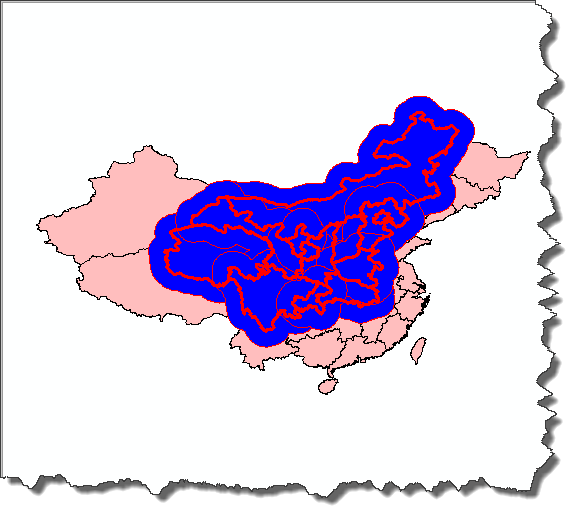
private void button1_Click(object sender, EventArgs e) { while (true) { pGraphicsContainer = pMap as IGraphicsContainer; //定义容器 pFeature = pEnumFeature.Next(); //遍历要素 if (pFeature == null) //若不存在要素,则推出循环 break; pGeometry = pFeature.Shape; //获取要素的Geometry ITopologicalOperator pTopoOperator = pGeometry as ITopologicalOperator; //QI到拓扑操作 IGeometry pBufferGeo = pTopoOperator.Buffer(2); //缓冲区分析 IElement pElement = new PolygonElement(); pElement.Geometry = pBufferGeo; //获取得到的缓冲区 pGraphicsContainer.AddElement(pElement, 0); //显示缓冲区 pActiveView.Refresh(); } }
※ | ※ → Boundary:
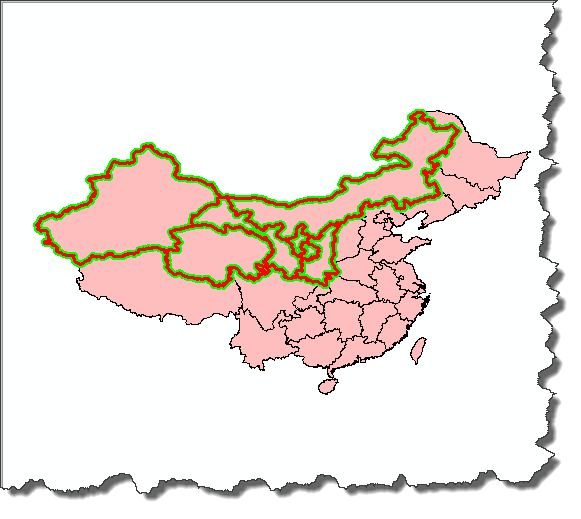
private void button2_Click(object sender, EventArgs e) { while (true) { pGraphicsContainer = pMap as IGraphicsContainer; //定义容器 pFeature = pEnumFeature.Next(); //遍历要素 if (pFeature == null) //若不存在要素,则推出循环 break; pGeometry = pFeature.Shape; //获取要素的Geometry ITopologicalOperator pTopoOperator = pGeometry as ITopologicalOperator; //QI到拓扑操作 IGeometry pBoundary = pTopoOperator.Boundary; //获取边界 ILineElement pLineEle = new LineElementClass(); ISimpleLineSymbol pSLS = new SimpleLineSymbol(); IRgbColor pColor = GetColor(0, 255, 0); pSLS.Color = pColor; pSLS.Width = 5; pLineEle.Symbol = pSLS; IElement pElement = pLineEle as IElement; pElement.Geometry = pBoundary; pGraphicsContainer.AddElement(pElement, 0); //显示边界 pActiveView.Refresh(); } }
※ | ※ → Clip:
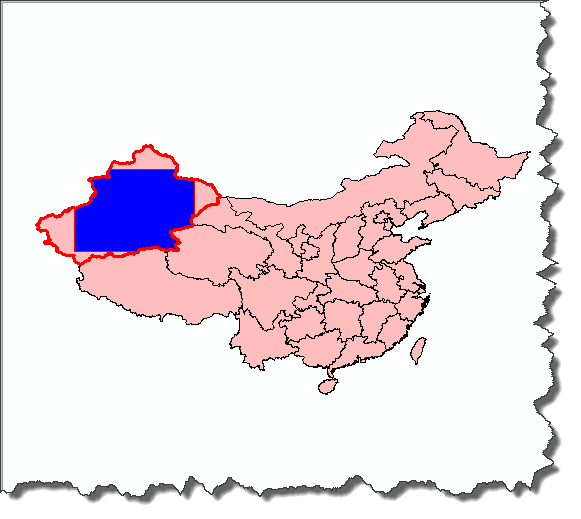
bool isClip = false; private void button3_Click(object sender, EventArgs e) { isClip = true; } private void button4_Click(object sender, EventArgs e) { while (true) { pGraphicsContainer = pMap as IGraphicsContainer; //定义容器 pFeature = pEnumFeature.Next(); //遍历要素 if (pFeature == null) //若不存在要素,则推出循环 break; pGeometry = pFeature.Shape; //获取要素的Geometry ITopologicalOperator pTopoOperator = pGeometry as ITopologicalOperator; //QI到拓扑操作 pTopoOperator.Clip(pEnvClip); IElement pElement = new PolygonElement(); pElement.Geometry = pGeometry; //获取得到的缓冲区 pGraphicsContainer.AddElement(pElement, 0); //显示缓冲区 pActiveView.Refresh(); } }
※ | ※ → ConvexHull:
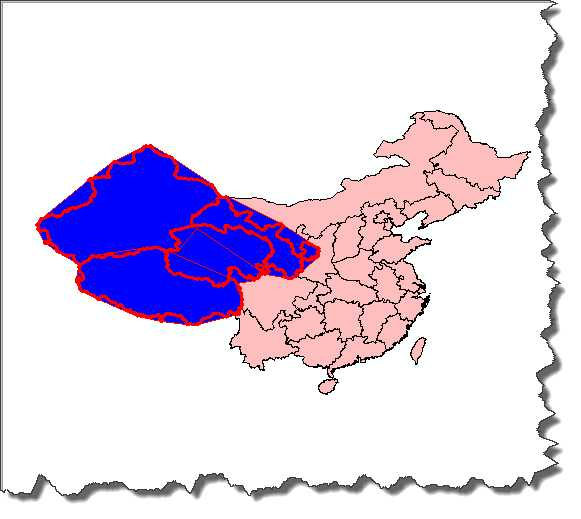
private void button5_Click(object sender, EventArgs e) { while (true) { pGraphicsContainer = pMap as IGraphicsContainer; //定义容器 pFeature = pEnumFeature.Next(); //遍历要素 if (pFeature == null) //若不存在要素,则推出循环 break; pGeometry = pFeature.Shape; //获取要素的Geometry ITopologicalOperator pTopoOperator = pGeometry as ITopologicalOperator; //QI到拓扑操作 IGeometry pBufferGeo = pTopoOperator.ConvexHull(); IElement pElement = new PolygonElement(); pElement.Geometry = pBufferGeo; //获取得到的缓冲区 pGraphicsContainer.AddElement(pElement, 0); //显示缓冲区 pActiveView.Refresh(); } }
※ | ※ → Cut:
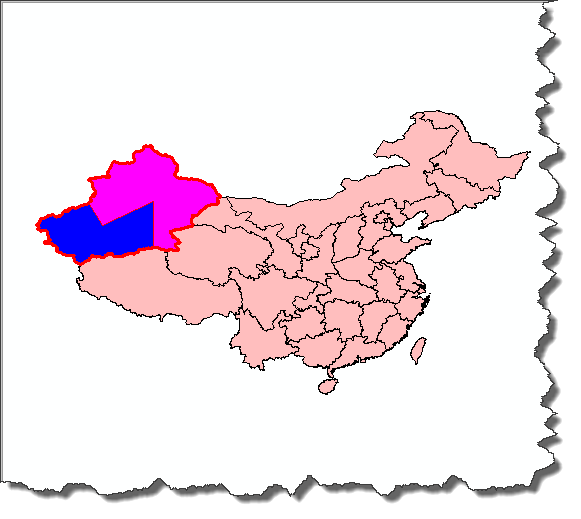
bool isCut = false; private void button6_Click(object sender, EventArgs e) { isCut = true; } private void button7_Click(object sender, EventArgs e) { while (true) { pGraphicsContainer = pMap as IGraphicsContainer; //定义容器 pFeature = pEnumFeature.Next(); //遍历要素 if (pFeature == null) //若不存在要素,则推出循环 break; pGeometry = pFeature.Shape; //获取要素的Geometry ITopologicalOperator pTopoOperator = pGeometry as ITopologicalOperator; //QI到拓扑操作ry IGeometry pGeoRight = new PolygonClass(); IGeometry pGeoLeft = new PolygonClass(); pTopoOperator.Cut(pLineCut, out pGeoLeft, out pGeoRight); IElement pElement = new PolygonElement(); IFillShapeElement pFillEle = pElement as IFillShapeElement; ISimpleFillSymbol pSFS = new SimpleFillSymbol(); pSFS.Color = GetColor(255, 255, 0); pFillEle.Symbol = pSFS; pElement.Geometry = pGeoLeft; //获取得到的缓冲区 pGraphicsContainer.AddElement(pElement, 0); //显示缓冲区 pSFS = new SimpleFillSymbol(); pSFS.Color = GetColor(255, 0, 255); pFillEle.Symbol = pSFS; pElement = new PolygonElement(); pElement.Geometry = pGeoRight; //获取得到的缓冲区 pGraphicsContainer.AddElement(pElement, 0); //显示缓冲区 pActiveView.Refresh(); } }
※ | ※ → Union:
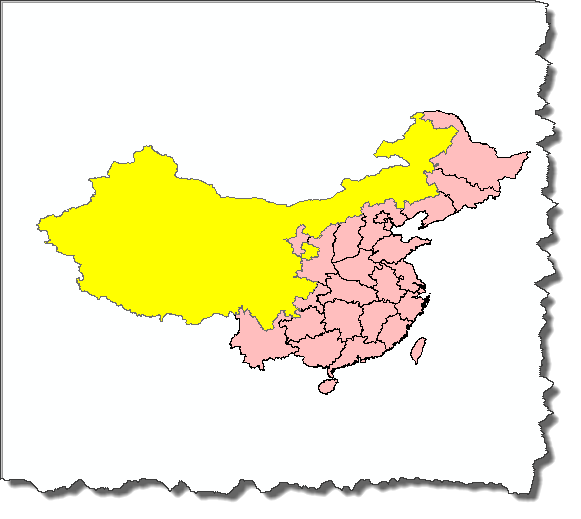
private void button8_Click(object sender, EventArgs e) { IGeometry pUnionGeo = new PolygonClass(); pGraphicsContainer = pMap as IGraphicsContainer; //定义容器 while (true) { pFeature = pEnumFeature.Next(); //遍历要素 if (pFeature == null) //若不存在要素,则推出循环 break; pGeometry = pFeature.Shape; //获取要素的Geometry ITopologicalOperator pTopoOperator = pUnionGeo as ITopologicalOperator; //QI到拓扑操作ry pUnionGeo = pTopoOperator.Union(pGeometry); } IElement pElement = new PolygonElement(); IFillShapeElement pFillEle = pElement as IFillShapeElement; ISimpleFillSymbol pSFS = new SimpleFillSymbol(); pSFS.Color = GetColor(255, 255, 0); pFillEle.Symbol = pSFS; pElement.Geometry = pUnionGeo; //获取得到的缓冲区 pGraphicsContainer.AddElement(pElement, 0); //显示缓冲区 pActiveView.Refresh(); }
※ | ※ → Intersect:
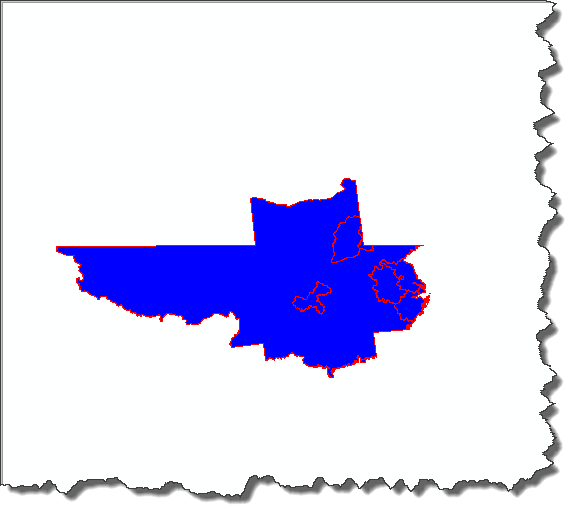
bool isFirstIn = false; private void button10_Click(object sender, EventArgs e) { isFirstIn = true; }
private void button11_Click(object sender, EventArgs e)
{
isFirstIn = false;
pFirstPolygon = new PolygonClass();
while (true)
{
pFeature = pEnumFeature.Next();
if (pFeature == null)
break;
pGeometry = pFeature.Shape;
ITopologicalOperator pTopoOperator = pFirstPolygon as ITopologicalOperator;
pFirstPolygon = pTopoOperator.Union(pGeometry) as IPolygon;
}
}
private void button12_Click(object sender, EventArgs e) { IGeometry pIntersectGeo = new PolygonClass(); IGeometry pSecondPolygon = new PolygonClass(); pGraphicsContainer = pMap as IGraphicsContainer; while (true) { pFeature = pEnumFeature.Next(); if (pFeature == null) break; pGeometry = pFeature.Shape; ITopologicalOperator pTopoOperator = pSecondPolygon as ITopologicalOperator; pSecondPolygon = pTopoOperator.Union(pGeometry) as IPolygon; } ITopologicalOperator pTopo = pSecondPolygon as ITopologicalOperator; pIntersectGeo = pTopo.Intersect(pFirstPolygon, esriGeometryDimension.esriGeometry2Dimension) as IPolygon; IElement pElement = new PolygonElementClass(); pElement.Geometry = pIntersectGeo; pGraphicsContainer.AddElement(pElement, 0); IFeatureLayer pFeatureLayer = pMap.get_Layer(0) as IFeatureLayer; pFeatureLayer.Visible = false; pFeatureLayer = pMap.get_Layer(1) as IFeatureLayer; pFeatureLayer.Visible = false; pActiveView.Refresh(); }
※ | ※ → Difference:(需要前面两部分)
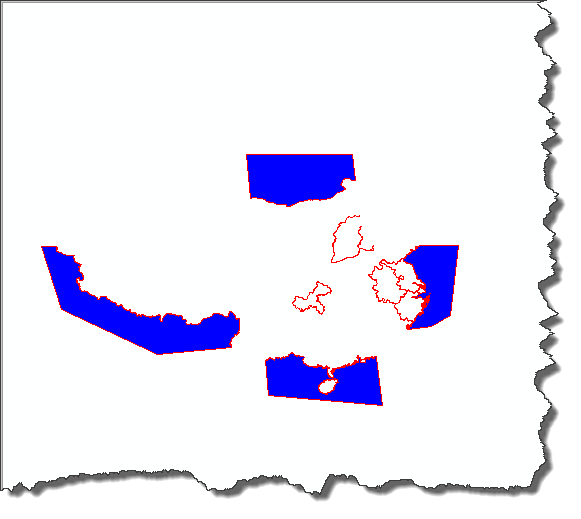
private void button13_Click(object sender, EventArgs e) { IGeometry pIntersectGeo = new PolygonClass(); IGeometry pSecondPolygon = new PolygonClass(); pGraphicsContainer = pMap as IGraphicsContainer; while (true) { pFeature = pEnumFeature.Next(); if (pFeature == null) break; pGeometry = pFeature.Shape; ITopologicalOperator pTopoOperator = pSecondPolygon as ITopologicalOperator; pSecondPolygon = pTopoOperator.Union(pGeometry) as IPolygon; } ITopologicalOperator pTopo = pSecondPolygon as ITopologicalOperator; pIntersectGeo = pTopo.Difference(pFirstPolygon) as IPolygon; IElement pElement = new PolygonElementClass(); pElement.Geometry = pIntersectGeo; pGraphicsContainer.AddElement(pElement, 0); IFeatureLayer pFeatureLayer = pMap.get_Layer(0) as IFeatureLayer; pFeatureLayer.Visible = false; pFeatureLayer = pMap.get_Layer(1) as IFeatureLayer; pFeatureLayer.Visible = false; pActiveView.Refresh(); }
---------------------------------------------------------------------------------------------------------
╔════════╗
╠════╣ 第A2个 ╠══════════════════════════════════════════════════╣
╚════════╝
●·● IRelationalOperator 接口:
1. Provides access to members that determine if a certain spatial relationship exists between two geometries.
Members
| Description | ||
|---|---|---|
 |
Contains | Indicates if this geometry contains the other geometry. 前者是否包含后者! |
 |
Crosses | Indicates if the two geometries intersect in a geometry of lesser dimension. |
 |
Disjoint | Indicates if the two geometries share no points in common. Negate this result to compute the Intersect relation. |
 |
Equals | Indicates if the two geometries are of the same type and define the same set of points in the plane. |
 |
Overlaps | Indicates if the intersection of the two geometries has the same dimension as one of the input geometries. 前者和后者是否有重叠!不包括包含关系! |
 |
Relation | Indicates if the defined relationship exists. |
 |
Touches | Indicates if the boundaries of the geometries intersect. |
 |
Within | Indicates if this geometry is contained (is within) another geometry. 前者是否在后者内部! |
CoClasses that implement IRelationalOperator
| CoClasses and Classes | Description |
|---|---|
| Envelope | A rectangle with sides parallel to a coordinate system defining the extent of another geometry; optionally has min and max measure, height and ID attributes. |
| GeometryBag | An ordered collection of objects that support the IGeometry interface. |
| MultiPatch | A collection of surface patches. |
| Multipoint | An ordered collection of points; optionally has measure, height and ID attributes. |
| Point | A two dimensional point, optionally with measure, height, and ID attributes. |
| Polygon | A collection of rings ordered by their containment relationship; optionally has measure, height and ID attributes. |
| Polyline | An ordered collection of paths; optionally has measure, height and ID attributes. |
※ | ※ → 公共代码部分:
IMap pMap;
IActiveView pActiveView;
IEnvelope pEnv;
ISelectionEnvironment pSelectionEnv;
IEnumFeature pEnumFeature;
IFeature pFeature;
IGeometry pGeometry;
IGeometry pBasicGeo;
private void axMapControl1_OnMouseDown(object sender, IMapControlEvents2_OnMouseDownEvent e) { axMapControl1.MousePointer = esriControlsMousePointer.esriPointerCrosshair; pMap = axMapControl1.Map; pActiveView = pMap as IActiveView; pEnv = axMapControl1.TrackRectangle(); pSelectionEnv = new SelectionEnvironment(); pSelectionEnv.DefaultColor = GetColor(255, 0, 0); pMap.SelectByShape(pEnv, pSelectionEnv, false); pActiveView.Refresh(); pEnumFeature = pMap.FeatureSelection as IEnumFeature; }
private IRgbColor GetColor(int r, int g, int b) { IRgbColor pColor = new RgbColor(); pColor.Red = r; pColor.Green = g; pColor.Blue = b; return pColor; }
private IGeometry GetBasicGeometry() { IFeatureLayer pFeatureLayer = axMapControl1.Map.get_Layer(1) as IFeatureLayer; IFeatureClass pFeatureClass = pFeatureLayer.FeatureClass; IFeatureCursor pFeatureCursor = pFeatureClass.Search(null, false); IFeature pF = pFeatureCursor.NextFeature(); IGeometry pUnionGeo = new PolygonClass(); pUnionGeo = pF.Shape; while(pF != null) { ITopologicalOperator pUnionTopo = pUnionGeo as ITopologicalOperator; pUnionGeo = pUnionTopo.Union(pF.Shape); pF = pFeatureCursor.NextFeature(); } return pUnionGeo; }
private void Form1_Load(object sender, EventArgs e) { (axMapControl1.get_Layer(1) as IFeatureLayer).Selectable = false; }
※ | ※ → Contains:
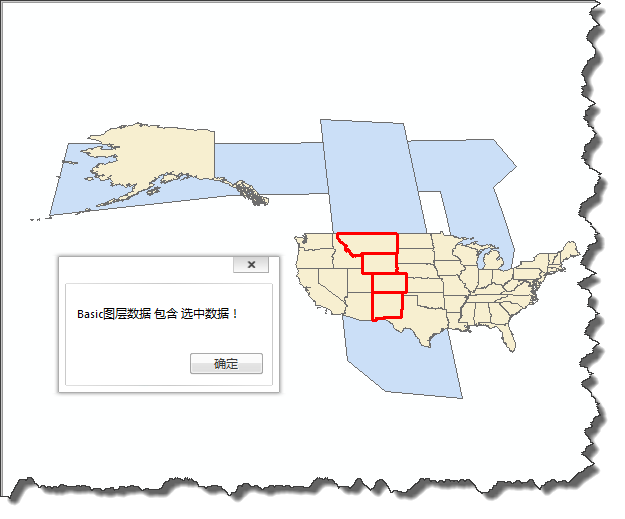
private void button5_Click(object sender, EventArgs e) { pBasicGeo = GetBasicGeometry(); pGeometry = new PolygonClass(); while (true) { pFeature = pEnumFeature.Next(); if (pFeature == null) break; ITopologicalOperator pTopo = pGeometry as ITopologicalOperator; pGeometry = pTopo.Union(pFeature.Shape); } IRelationalOperator pRO = pBasicGeo as IRelationalOperator; bool IsContains = pRO.Contains(pGeometry); if (IsContains) { MessageBox.Show("Basic图层数据 包含 选中数据!"); } else { MessageBox.Show("Basic图层数据 不包含 选中数据!"); } }
※ | ※ → Overlaps:
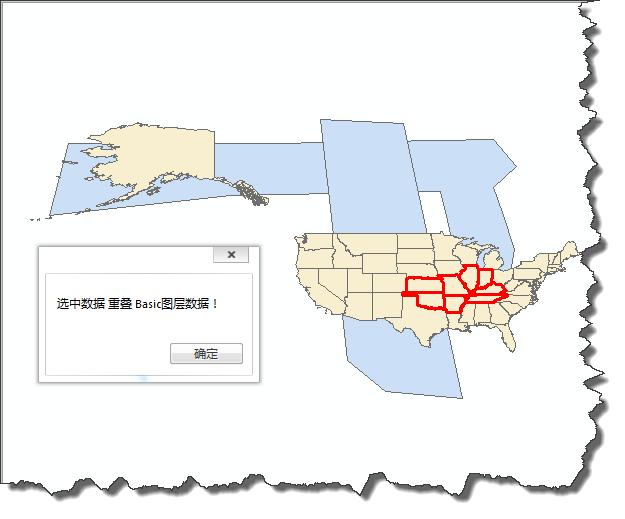
private void button2_Click(object sender, EventArgs e) { pBasicGeo = GetBasicGeometry(); pGeometry = new PolygonClass(); while (true) { pFeature = pEnumFeature.Next(); if (pFeature == null) break; ITopologicalOperator pTopo = pGeometry as ITopologicalOperator; pGeometry = pTopo.Union(pFeature.Shape); } IRelationalOperator pRO = pGeometry as IRelationalOperator; bool IsContains = pRO.Overlaps(pBasicGeo); if (IsContains) { MessageBox.Show("选中数据 重叠 Basic图层数据!"); } else { MessageBox.Show("选中数据 不重叠 Basic图层数据!"); } }